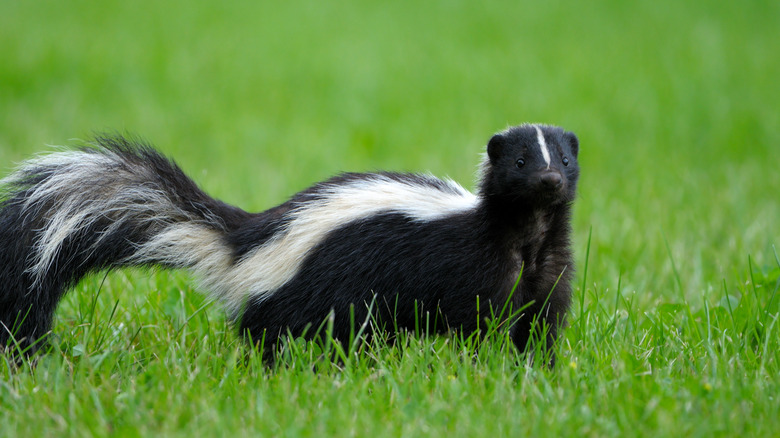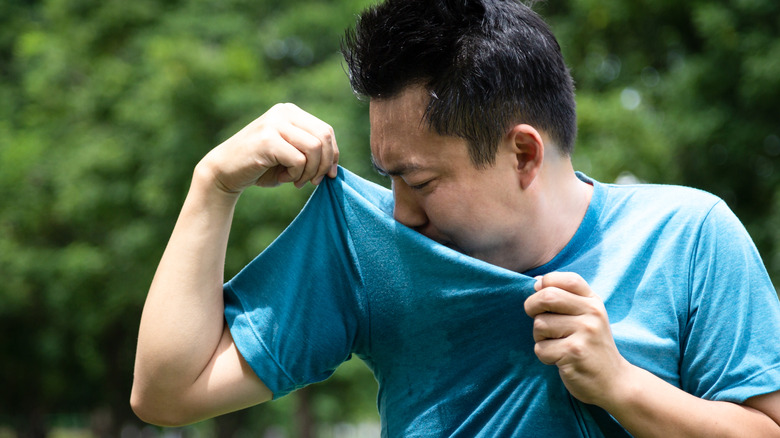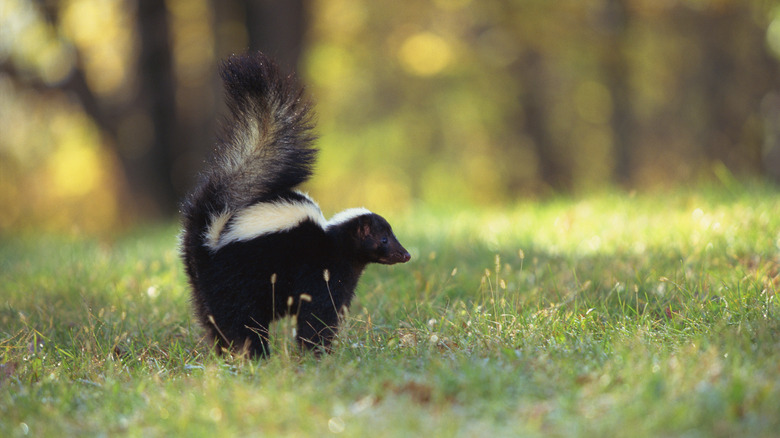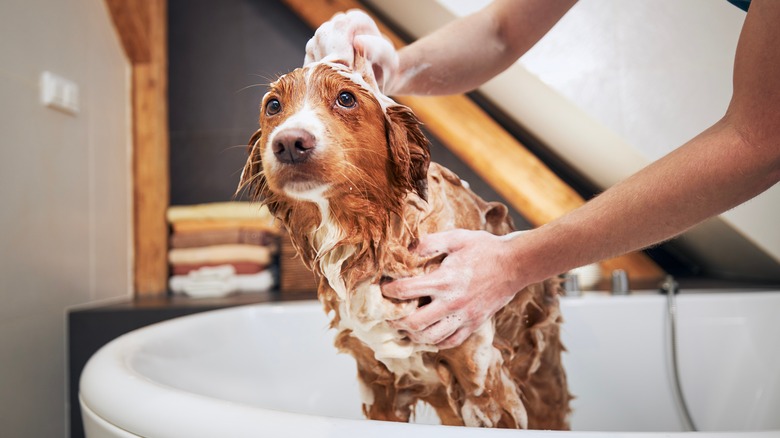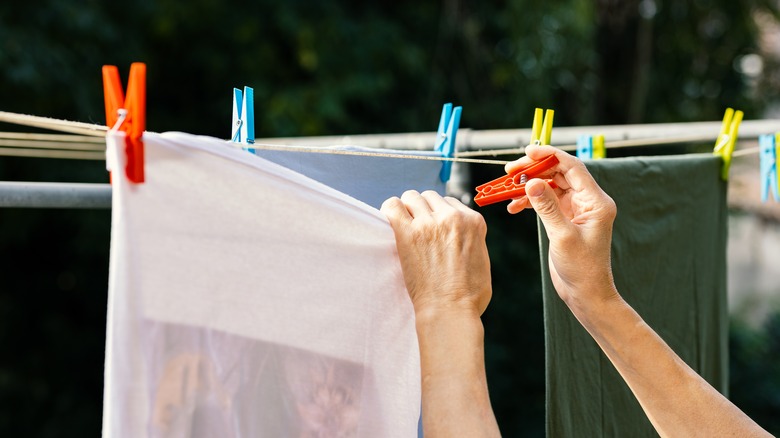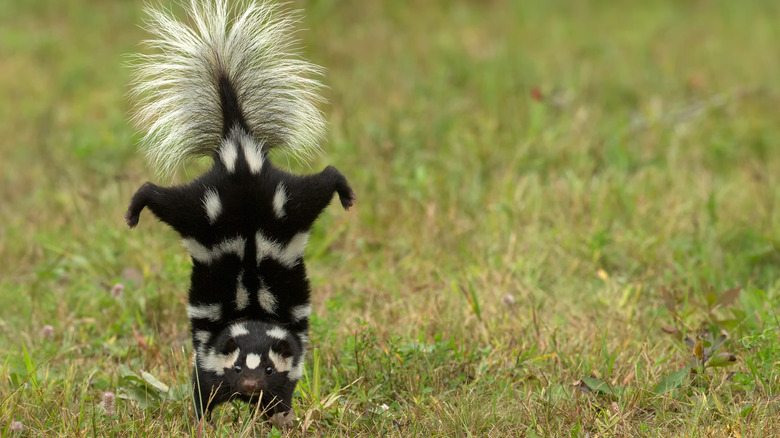If You Get Sprayed By A Skunk Here's What To Do
There are a few things you probably don't want to run into while outside at night, and if we had to guess, a skunk would be at the top of the list. Despite being kinda cute, these little critters can easily ruin your evening (if not your entire week) with their oily, stinky spray. And it doesn't just smell awful — it's also quite difficult to wash off. Indeed, this spray can easily soak into skin, fabrics, and hair and stay there for two to three weeks.
Unfortunately, many of the myths circulating online about how to get rid of skunk smell aren't effective (looking at you, tomato juice). If you really want to get rid of the odor, it turns out that time is the most important factor. The faster you wash off skunk spray, the less chance it has to soak into your skin and hair, and the better you will smell. However, because skunk spray is oil-based, just using regular soap and water won't do the trick. So, what should you do if you're ever unlucky enough to get sprayed by a skunk?
Leave everything outside and grab the dish soap
Because the smell of skunk spray can spread so easily, leave as much clothing and accessories as possible outside to prevent the odor from getting into your house. This includes shirts, jewelry, your purse or backpack, your dog's collar and leash, your shoes, and anything else that may have gotten sprayed. These things can be washed later, and leaving them outside will save you the future headache of trying to lift the smell out of furniture and carpets.
The next step is to grab the dish soap — or any other soap that is formulated to combat grease and oil — and head to the shower to start washing your skin and hair. Dishwashing detergent and anti-oil shampoo also work in a pinch. You may need to scrub and wash yourself over and over again to remove as much of the oil molecules as possible.
Neutralize the odor with hydrogen peroxide and baking soda
If you have the ingredients available, you can make a particularly effective skunk spray-fighting wash by mixing dish soap, hydrogen peroxide, and baking soda. The Humane Society recommends a mixture of 1 quart of 3% hydrogen peroxide, ¼ cup of baking soda, and 1 teaspoon of dishwashing soap as a safe and effective way to remove the odor. This method works better than other options because the dishwashing liquid lifts the oil from your skin, while the hydrogen peroxide and baking soda neutralize the odor molecules.
However, this mixture only works when applied immediately after combining the ingredients. Also, you should let it sit on your skin for around five minutes before rinsing off in the shower for maximum effectiveness. As hydrogen peroxide and baking soda together can act as a bleaching agent, it is best to avoid putting this mixture in your hair. If you don't have hydrogen peroxide readily available, Healthline suggests soaking in a baking soda and hot water bath for 15 to 20 minutes. After the bath, make sure to shower again to rinse the baking soda residue off your skin.
Cleaning your pet
Because pets are often coated in thick fur, washing skunk spray off of them can be a little more complex. If possible, the best option is to wash your animal friend outside to make sure they don't rub any oils onto your carpets or furniture. To protect yourself from the smelly oil, wear old clothes and gloves that can be thrown away afterward.
The same skunk spray washes that work well on humans also work on pets. Dishwashing soap is a good choice — and an even better option is the previously mentioned mixture of dish soap, hydrogen peroxide, and baking soda. However, this odor-removing option runs the risk of bleaching your pet's fur (just as it does when used on human hair). To avoid this, rinse the mixture off immediately after applying and then wash your pet again with their normal pet shampoo.
Many pet stores also sell specific formulas for removing skunk spray from furry friends that are quite effective. One Redditor on the survival forum of the website recommended buying the skunk odor-removing wash from Nature's Miracle as a good option. Another commenter agreed, saying that the wash "works better than anything except hydrogen peroxide."
Getting the smell out of your clothes
After you've washed yourself or your pet as best you can, you can turn to other items that have been affected, like your clothes or your pet's collar and leash. Luckily, washing skunk scent out of clothes isn't as hard as getting it out of your hair or off your skin. Healthline recommends soaking your skunk-sprayed clothes in a mixture of laundry detergent, hot water, and ½ cup of baking soda. Rinse and repeat until the smell no longer remains. To really fight the odor, try first soaking the clothes in a mixture of vinegar and water for a few hours before washing them with baking soda and detergent.
If possible, try and hang your affected pieces of clothing outside to dry in the sun and avoid putting them in your dryer. Drying skunky clothes in the machine can lead to the smell setting into the fabric and becoming much harder — if not impossible — to remove.
How to avoid getting sprayed in the first place
Because there are a few warning signs that a skunk is about to spray, you can avoid the unfortunate fate of being targeted by one of these critters by understanding its body language. After all, skunks are actually quite shy animals and will only spray if frightened or when protecting their babies (called kits). Furthermore, skunks prefer not to spray because after releasing their foul-smelling defense mechanism, it takes them around 8 to 10 days to replenish their resources enough to be able to do so again.
So, if you see a skunk, the best thing you can do is to back away and give it space. It's important not to startle or frighten the skunk and to keep any pets away from it. Some signs that a skunk is upset and may be about to spray include: stamping its front feet, hissing, charging, turning its backend in your direction, or doing a handstand.
